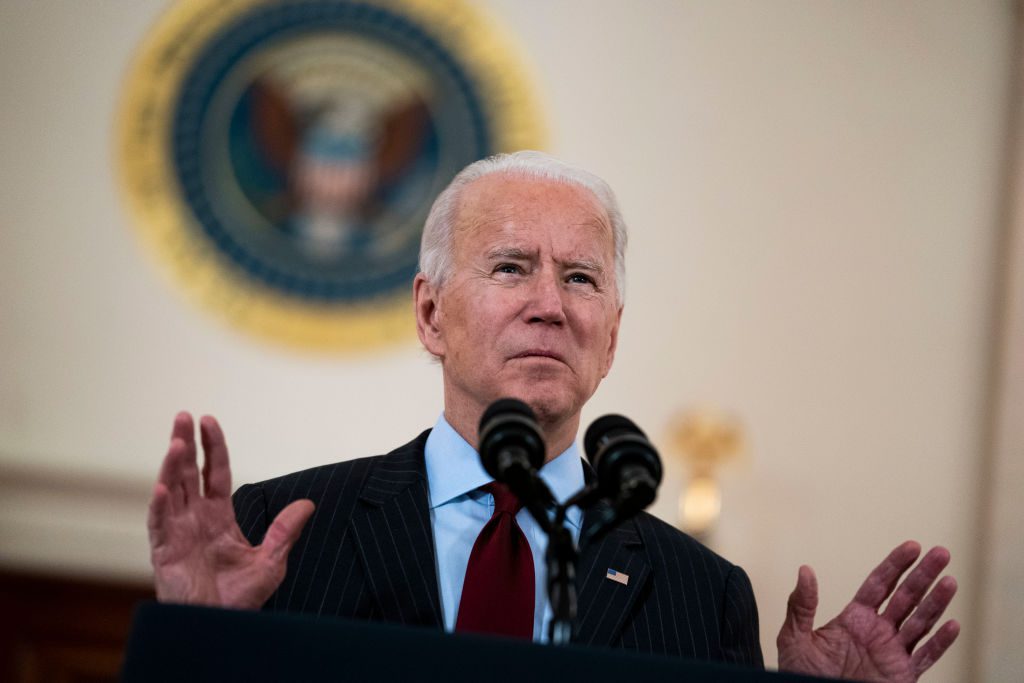So Much for the Biden ‘Return to Normalcy’

Joe Biden the moderate—there were some who actually believed that. Bernie Sanders might have wanted to nationalize ice cream trucks, Tulsi Gabbard might have sought to blow up the world by removing a few troops from the Middle East, but Biden was to be a cooler cat. The former senator from Delaware would put our politics at a simmer after four years of Donald Trump’s rolling boil. There was even discussion as to whether he was the “return to normalcy” candidate, echoing Warren Harding’s pledge a century earlier to an electorate exhausted by Woodrow Wilson.
There was always reason to doubt Biden’s supposed moderation. For one thing, the nation right now faces many immoderate problems, which are tempting to answer with immoderate solutions. For another, Biden has demonstrated a feline ability to change his positions, allowing his voters and activists to successfully pressure him from the left.
Whatever the case, the fact is that any return to normalcy seems a dead letter. Instead Biden’s first 100 days could end up being the most radical and ambitious of any president’s since at least Ronald Reagan.
James Madison said, “Crisis is the rallying cry of the tyrant”; we might also add that it’s the fuel for the upstart administration. Reagan used stagflation and high unemployment to aggressively push for smaller government, while Biden is leveraging the coronavirus to do the opposite. On deck is a $1.9 trillion stimulus package, about twice the amount (adjusted for inflation) that Barack Obama got during the Great Recession in 2009. It contains another round of checks for Americans, yet much of its spending has nothing to do with COVID and more than a third of it wouldn’t be spent until 2022 or later, after the pandemic has likely subsided. Naturally it’s stuffed with left-wing goodies: “environmental justice” grants, payments to closed schools at the behest of teachers’ unions, more money for family planning organizations like Planned Parenthood.
By far its most audacious provision would have phased up the federal minimum wage to $15 an hour. That was ultimately excised by the Senate, but it still passed the House, despite its being absurdly cruel. Imagine you’re the owner of a small business or local restaurant: you’re already cutting costs and furloughing staff, wondering whether you’ll make it through the year. And then the government slams down and demands that you pay your employees more. To significantly hike the minimum wage during a recession isn’t sensible governance; it’s ideological wish-list checking, deaf to circumstance and the harm that could be caused.
The same goes for the Equality Act, the social engineering legislation that’s just wormed its way through the House. The bill would expand the Civil Rights Act of 1964 to prohibit discrimination against sexual orientation and gender identity. It would enlarge the CRA to cover not just employment and housing but “public accommodations” and government services. And it quite glaringly includes no exemption for religious freedom. Taken together, this would mean an end to the dilemma of whether the Christian baker must make a cake for a gay wedding; under the Equality Act, he would have no choice. The effect of the bill would be to destroy the constitutional rights of one minority in favor of the rights claimed by another.
Then there’s H.R. 1, the so-called For the People Act. It’s a usurpation by the federal government of election laws previously left to the states. It would implement a workaround to voter ID provisions, on the books in 36 states, which require the presentation of some form of identification at the polls. It would also mandate same-day voter registration, allowing authorities no time to verify that the information provided by registrants is accurate. Those two provisions alone would make enforcement against voter fraud much more difficult.
All these bills would stoke disruption and division, further inflaming the culture war. And in fairness, not all of them have yet made it through the Senate, which Democrats control only with Kamala Harris as tiebreaker. It’s thus possible that for all his maneuvering, Biden could end up like George W. Bush, who swaggered into the Oval Office only for his first 100 days to prove disappointingly thin. (Though Biden has been plenty busy on his own. He’s so far approved an unprecedented number of executive orders, while also taking time out of his busy schedule to illegally bomb Syria.)
Either way, it may be that it’s time for a postmortem for that phrase “return to normalcy.” It was, after all, forged in the heat of the 1920 presidential campaign, and almost all campaign slogans are deceptive on substance. Warren Harding understood that the public wanted a break from years of war and Spanish flu and extremism, but he didn’t mean to paralyze his own government: as president, he cut taxes, deregulated the economy, hiked agriculture tariffs, and created the Office of Management and Budget. We remember him less because he resumed some kind of primordial status quo than because he, and later his veep Calvin Coolidge, implemented a course change and the economy got better.
Likewise was Biden never going to content himself with cutting ribbons and pleading for calm. Still, it’s worth noting just how much Biden has not returned to normal, how quickly progressives have lurched towards the abnormal. Five years ago, a $15 minimum wage was a fanciful Seattle lab experiment; today, it’s under consideration by Congress. Five years ago, the Obergefell decision had just been passed down; today, the Christian baker must submit or else. Donald Trump once pledged that he would fight the left. He leaves us now with a question: what if he only radicalized them further and then empowered them?
Comments